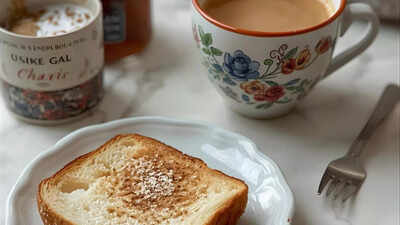ARTICLE AD BOX

There is something undeniably comforting about the classic chai and toast combo. It is quick, familiar, and sets the mood for a slow morning. But while this simple duo may seem harmless, recent research suggests that the daily habit might not be as healthy as it appears.
The issue is not with the ingredients alone but with how they interact with your body over time.A peer-reviewed study published in the European Journal of Clinical Nutrition found that diets high in refined carbohydrates and sweetened beverages, such as tea loaded with sugar and white bread toast, can increase the risk of insulin resistance and metabolic syndrome. Researchers noted that frequent consumption of these foods can disrupt blood glucose levels and trigger inflammatory responses, especially when consumed as a regular breakfast option.
The hidden calories in your chai
For many people, chai is more than just tea; it is an emotion. Yet, that comforting cup can quietly pack in more calories than you expect. Traditional Indian chai is often brewed with full-fat milk and several teaspoons of sugar. While that might make it rich and flavourful, it also turns it into a sugar-dense beverage. Drinking it daily can lead to excess calorie intake and weight gain over time, especially if you are not compensating through physical activity.
Caffeine is another part of the picture. A moderate amount can boost alertness and mood, but excessive intake throughout the day may lead to dehydration, anxiety, or disrupted sleep. Black tea contains tannins, which, when consumed in large quantities, can interfere with iron absorption. If your chai is always accompanied by a sugary snack or white bread toast, you are essentially creating a high-carb, low-nutrient breakfast that spikes blood sugar quickly and leaves you sluggish a few hours later.
The overlooked side effects of toast
Toast seems like the simplest, safest breakfast, quick to make, easy to eat, and endlessly versatile. But the kind of bread you choose and how you prepare it makes all the difference. Most people still reach for white bread, which has been stripped of fibre and nutrients during processing. The result is a refined carb that digests rapidly, causes sudden blood sugar spikes, and leaves you hungrier within a couple of hours.Compared with whole-grain varieties, white toast offers very little in the way of vitamins and minerals. Essential nutrients like iron, magnesium, and B-vitamins are lost in the refining process, which is why it feels less filling even when you have eaten enough. The crunch you enjoy also comes with a quiet risk, over-toasting can lead to the formation of acrylamide, a chemical that appears when starchy foods are cooked at high temperatures.
The other silent culprit lies in the toppings. Margarine, jam, and sweet spreads may seem harmless, but they are often packed with hidden sugars and trans fats that cancel out the minor benefits of the toast itself. The best way to enjoy your slice is by keeping it golden, not burnt, and pairing it with healthier options like nut butter, avocado, or eggs. A few simple swaps can turn your everyday toast from a source of empty calories into a genuinely nourishing start to the day.
How to make your chai and toast healthier
You do not need to give up your morning ritual entirely. A few adjustments can help balance your breakfast without compromising on comfort. Start by cutting down the sugar in your chai gradually until your taste buds adjust. Using toned or plant-based milk instead of full-fat dairy can also reduce the saturated fat content. For added flavour, try spices like cinnamon, cardamom, or ginger, which enhance the aroma while offering antioxidant benefits.When it comes to toast, switch to whole-grain or multigrain bread rich in fibre and complex carbohydrates. These varieties digest slowly, keeping you full longer and stabilising energy levels. Pair your toast with proteins and healthy fats, such as eggs, hummus, or almond butter, to make your meal more balanced. It is also wise to eat your breakfast slowly and mindfully, allowing your body to register satiety before you reach for a second cup of tea.Chai and toast have cultural roots that run deep, but like most comfort foods, they can become problematic when eaten without balance. The sugar, refined carbs, and poor-quality fats in your morning combo can silently affect your metabolism and energy levels over time. The good news is that small, mindful changes can protect your health while keeping your mornings just as satisfying. The perfect breakfast does not have to be fancy; it just needs to be smart.Disclaimer: This article is for general informational purposes only and is not a substitute for professional medical advice, diagnosis, or treatment. Always seek the guidance of a qualified healthcare provider regarding any medical condition or lifestyle change.Also read| Why this simple fluid changes everything you eat: The secret link between saliva and taste

 2 hours ago
5
2 hours ago
5









 English (US) ·
English (US) ·